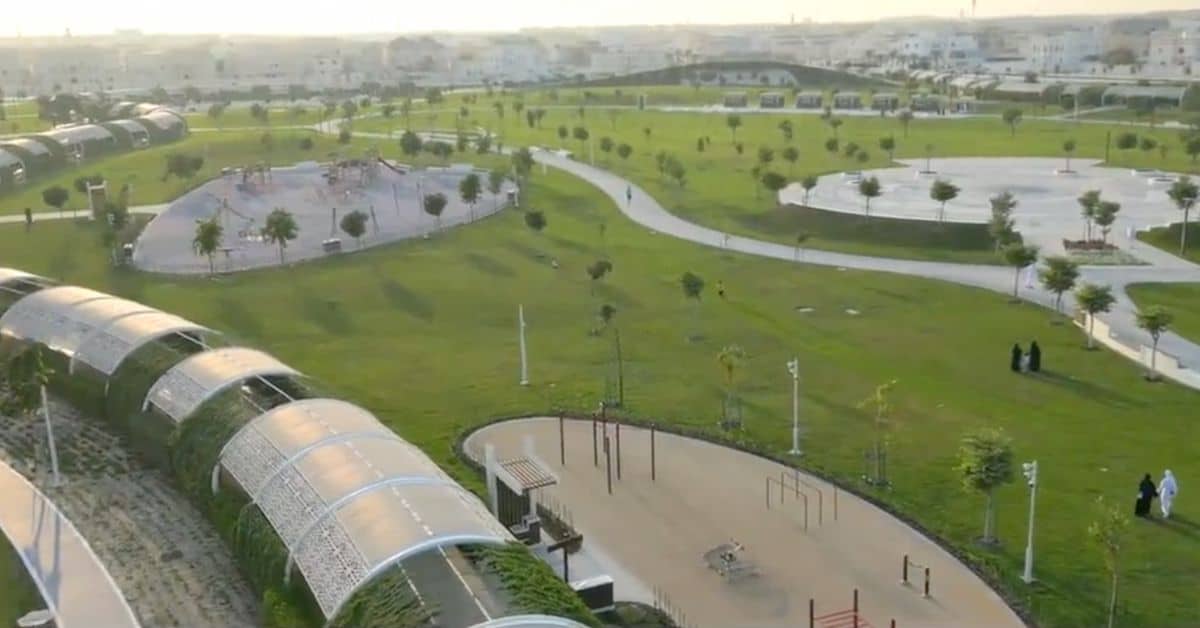RIYADH, SAUDI ARABIA — The Gulf countries are renowned for their scorching summer temperatures, rendering their streets and roads unsuitable for walking and exercising. To combat these extreme heat conditions, the Gulf countries have innovatively developed new technologies to reduce heat and maintain a pleasant atmosphere in their urban areas. These initiatives have proven successful in achieving their objectives, particularly through the implementation of techniques such as humidification and temperature reduction.
In Saudi Arabia, a country known for its desert climate and high temperatures, a new technology called “road cooling” has been introduced. On March 14, 2023, the Saudi Roads Authority, in collaboration with the Ministry of Municipality, announced the commencement of a technical experiment focused on cooling asphalt surfaces. The experiment was initiated due to the phenomenon of roads absorbing heat during the day, with temperatures sometimes reaching 70 degrees. This heat is then released at night, leading to increased energy consumption and air pollution.
To address this issue, the authority launched an experiment involving “cold sidewalks,” which consist of local materials with lower solar radiation absorption, reflective properties, and lower surface temperatures compared to traditional pavements. The objectives of this technology include reducing temperatures in neighborhoods and residential areas, decreasing energy consumption for cooling buildings, and mitigating the effects of climate change. The technology aims to create a more comfortable environment in waiting areas and gathering spaces, and it is part of ongoing scientific experiments to enhance road usage experience.
In Qatar, another Gulf nation facing high temperatures, efforts have been made to soften the atmosphere in the streets. In November of the previous year, Qatar’s Minister of Municipality, Abdullah Al-Subaie, inaugurated the “Umm Al-Seneim” park in Al-Rayyan city. This park features the world’s longest air-conditioned outdoor track, measuring 1,143 meters, designed to encourage public engagement in activities like running and walking.

Air-conditioned pedestrian paths have been designed with a focus on sustainability, including features such as regulated air renewal, the use of solar energy, and a commitment to tree planting and quality. Before the park’s opening, Qatar’s Public Works Authority “Ashghal” experimented with painting some streets in Doha blue to reduce asphalt temperatures by 15 to 20 degrees. The blue-painted road surface demonstrated a temperature drop to 57 degrees, compared to the 65 degrees recorded by the black asphalt surface. Sensors were installed to monitor the success of the experiment, and based on the results, the authority is considering broader application of this cooling technique in Qatar.
In the UAE, efforts have been made to cover streets and road lanes to reduce temperatures and protect pedestrians from the intense sun. Smart air-conditioned umbrellas have also been introduced at bus stations to provide shade for waiting passengers. Dubai Municipality has implemented a project utilizing solar energy for lighting and energy conservation. By covering streets and markets and spraying them with water, the temperature can be reduced by an average of five degrees below normal. Dubai stands out as the only fully air-conditioned city, with air-conditioning implemented in streets, buildings, squares, and other public amenities.
Bahrain’s Ministry of Works, Municipal Affairs, and Urban Planning launched the “Palm Propagation” initiative in February 2019. The objective of this initiative is to increase the number of palm trees in various regions of the country. The Bahraini authorities hope that by planting more trees and increasing the green areas, they can protect pedestrians from the heat and create a positive impact on the environment and society.
Kuwait, with its exceptionally high temperatures reaching up to 50 degrees, has developed visible solutions to address the extreme heat on its streets. One such solution involves experimenting with environmentally friendly materials for street painting.
The Kuwaiti Environment Public Authority has signed a cooperation agreement with a specialized Japanese company to conduct a pilot project. The project aims to paint certain streets with an environmentally friendly material that can reduce temperatures by approximately 10 degrees. Additionally, this material has the potential to reduce the volatility of gravel and extend the lifespan of roads.
The Authority has confirmed that if the experiment proves successful, the findings will be shared with the relevant authorities in Kuwait. This will pave the way for the widespread use of these temperature-lowering products, ultimately leading to improved road conditions throughout the country.








